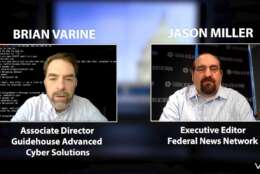Cybersecurity
-
Democrats had hoped to quickly confirm Alejandro Mayorkas, a Obama-era veteran of the Department of Homeland Security, as the new DHS secretary under President-elect Joe Biden. But Sen. Josh Hawley (R-Mo.) has said he will place a hold on Mayorkas' nomination.
January 19, 2021 -
One thing you can say about the Defense Department's cybersecurity efforts, they sure get a lot of oversight. The DoD office of inspector general reviewed 44 recent reports from various sources seeking to see how they all added up.
January 19, 2021 -
Buried in the next pandemic spending proposal from Joe Biden are big dollars for federal IT.
January 18, 2021 -
DISA launched its cloud-based internet isolation program as a way to keep malware off of DoD networks, but it also reduced the need for expensive IT infrastructure upgrades.
January 18, 2021 -
Sean Frazier, federal CSO at Okta, discusses identity management, lifecycle management, and some of the challenges of identification for Robotic Process Automation.
January 15, 2021 -
Brian Varine, the associate director of Guidehouse Advanced Cyber Solutions, said the SolarWinds breach highlighted gaps in agency cyber environments both from an operational and a visibility perspective.
January 15, 2021 -
President-elect Biden announces American Rescue Plan that includes significant funding increases for federal technology and cybersecurity to address long-standing challenges.
January 15, 2021 -
Federal agencies - and there are several of them at least - affected by the SolarWinds cybersecurity fiasco are under a new deadline.
January 14, 2021 -
In reviewing 15 large software development programs underway in the Defense Department, congressional auditors found that cyber concerns have the potential to stretch out projects or boost costs.
January 13, 2021 -
This week on Federal Tech Talk, Michael Geist, senior vice president of Strategy and Technology at Envistacom, joins host John Gilroy to discuss the step that federal agencies can take to protect data transmitted from satellites.
January 11, 2021 -
A cross-functional team is working on specific steps to implement an electromagnetic spectrum operations strategy DoD released in October.
January 11, 2021 -
The SFS program is the most effective tool available for the U.S. government and its nearly 80 partners in academia to collaborate on ensuring that the future government cybersecurity workforce is prepared to protect Americans’ increasingly digital lives.
January 08, 2021 -
The recent emergence of the Cybersecurity Maturity Model Certification initiative essentially ups the ante for its Defense Industrial Base.
January 05, 2021 -
The federal government has a big data loss problem and a reputational black eye from the recently-discovered Russian cybersecurity attack successes.
January 04, 2021 -
Discussing federal compliance with mandated standards isn’t a thrilling prospect for most businesses. But since the Defense Department relies on over 300,000 companies and subcontractors to maintain operations, it’s of massive import.
December 30, 2020














